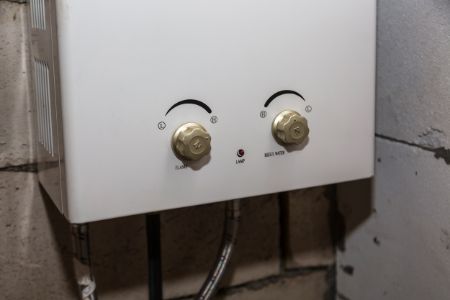Tankless Water Heaters - The Pros and Cons

Imagine never having to worry about running out of hot water in your home. No more family fights over who's hogging all the hot water during shower time, no more icy surprises while you're halfway through shampooing your hair - just endless hot water, whenever you need it. That's the beautiful dream that a tankless water heater seemingly promises to make real.
But do tankless water heaters live up to the hype, or is their promise of unlimited hot water too good to be true? In our opinion, tankless water heaters are pretty great, but like any piece of equipment, they aren't perfect. Tankless water heaters have their pros and cons, and understanding what those pros and cons are can help you determine if a tankless water heater is right for your household.
The Pros
Let's start off on a high note and jump right in with the pros - and there are quite a lot of pros. Aside from the obvious selling point (on-demand heating with a continuous supply of endless hot water), there are lots of other benefits to consider:
Compact Size
Traditional tanked water heaters are bulky, with the reservoir taking up a lot of space. But tankless water heaters, as the name implies, don't have tanks - they heat up water as it flows through them. This means that tankless water heaters are compact, making them a great fit for smaller homes where space is limited.
Safer Operation
Traditional tanks can corrode and leak as they age, and if the pressure relief valve gets clogged or damaged, there's always the risk (however rare) of explosion. Obviously, there's much less risk of that happening with a tankless heater. Tankless heaters also provide more precise temperature controls than most traditional water heaters, reducing the likelihood of getting accidentally scalded.
Energy Efficiency
Tanked water heaters have to continually use gas or electricity to maintain the temperature of the water that's sitting in the reservoir, but tankless water heaters only expend energy when they're actively heating water that's flowing through them. As such, tankless water heaters use much less energy than traditional water heaters, and may even end up paying for themselves over time through energy savings.
Extended Lifespan
Even today, the average expected lifespan of a traditional tank-style water heater is somewhere between 8-12 years (though, of course, that exact lifespan can vary between models). Tankless water heaters, on the other hand, last for significantly longer, with an average expected lifespan of 15-20 years.
The Cons
So far, so good, and to be clear, the tankless water heaters' "pros" are nothing to sneeze at. However, they do come with certain drawbacks that consumers need to be aware of, too:
High Upfront Costs
Though the exact cost depends on the unit and what's required for installation, the cost to install a tankless water heater can be up to several times more than that of a traditional heater installation. While a tankless water heater may end up eventually paying for itself through energy savings, as previously mentioned, that high upfront cost may still be prohibitive to some.
Limited Flow Rate
Since a tankless heater isn't limited to what's stored in a reservoir, it can keep heating water in a continuous stream without stopping to refill and reheat its tank. The downside is that tankless heaters are limited by their flow rate, aka how much water a tankless heater can process at once. One shower or tap running hot water for a long time shouldn't be an issue, but if multiple fixtures or appliances are using hot water simultaneously, a single tankless heater may struggle to meet demand unless it has a very high flow rate, and those units can prove especially expensive.
Maintenance
Though tankless heaters don't have tanks, they can still get clogged up with sediments. Most tankless water heaters need to be flushed once or twice a year, and you may also need to manually clean their filters once every few months or so. Not keeping up with maintenance can cause your heater to become damaged or lose efficiency.
Power Outages
Most traditional gas-powered heaters can still continue to produce hot water during a blackout as long as the pilot light stays lit. Tankless water heaters, on the other hand, are reliant on electricity - yes, even the ones that use gas for heating. Unless you have a generator or some other backup source of energy, you can't count on your tankless water heater to work during a power outage.
In Conclusion
Tankless water heaters are phenomenal pieces of plumbing equipment, but they aren't right for every consumer or every household. If you're on the fence about whether or not upgrading to a tankless water heater is right for you, it may be worth reaching out to a plumbing company for expert advice.
If that's the case, we highly recommend you give the pros here at New Era Plumbing, LLC a call. As Douglasville's foremost plumbing company, we are experts in handling water heater installations for both tanked and tankless water heaters. Based on your household and your hot water consumption needs, we'll assess your situation and talk it through to determine whether a tankless water heater is right for you - and if so, which model to get.
Thinking about switching to tankless water heaters? If so, talk to the plumbing professionals from New Era Plumbing, LLC today at 404-629-9478.